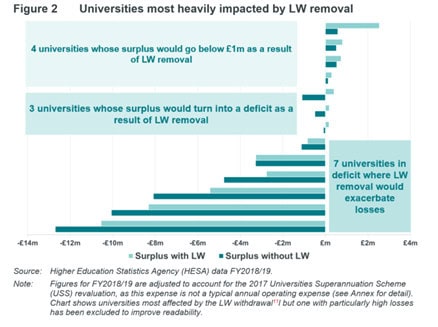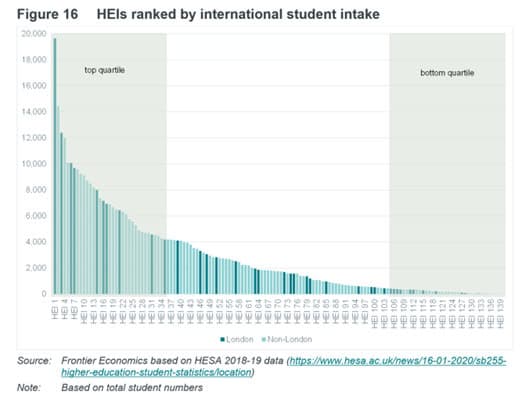A policy of conscious underfunding
This blog has been kindly contributed by Dr Diana Beech, Chief Executive Officer of London Higher – the umbrella body for over 40 universities and higher education colleges across London. You can find Diana on Twitter @dianajbeech.
Should the Government proceed with plans to cut the London Weighting element of the grant funding given to universities across the capital to help cover their higher costs of operating, this will be the first time that Westminster enacts a policy that consciously underfunds and penalises London. Given the levelling-up agenda, it will also likely not be the last.
New research released today by London Higher reveals that if the abolition of the London Weighting goes ahead this summer as per the Education Secretary’s instructions, the Government would be responsible for pushing at least three London universities into the red from an otherwise comfortable position. One provider can, in fact, be seen to move from a surplus of just under £1 million to a £1 million deficit, revealing how the plans to take funds away from London’s higher education sector would knowingly destabilise many of the capital’s universities and force them into unnecessary and preventable financial difficulty.
The removal of the London Weighting would also significantly reduce the surplus of at least four other London higher education institutions so that they are left just about breaking even and without a cushion to deal with any other costs that may arise – such as those incurred over the past year from the COVID pandemic or the threat of rising pension contributions.

For at least seven of the capital’s universities, which are already experiencing financial difficulties, the Government’s proposals to cut the London Weighting will only exacerbate their losses. In one case, the removal of the London Weighting would almost double the institution’s deficit from just over £2 million to around £5 million – meaning that any hope of recouping losses by the end of the year would be dashed overnight and universities would be left on a financial precipice, with no choice but to adopt hasty and more hard-line cost-cutting measures.
In the worst case scenario, the sudden removal of funds from London’s universities could result in an end to courses feeding shortage occupations for the NHS and other critical public services. This is because many of the higher education providers falling in this latter category are those training a large share of the country’s keyworkers – with just under half (43 per cent) of all students studying Medicine and Dentistry in England doing so in London and almost one-fifth (18 per cent) of the country’s nurses and other allied health professionals.
Typically, ‘keyworker’ courses, training the teachers, social care workers and the medical staff of tomorrow, have a high Home undergraduate student intake. In London, this means these students are more likely to be commuter students, who choose to stay in the family home while studying and have been shown to travel up to 90 minutes to get to campus across the city.
Often, being a commuter student intersects with one or more markers of disadvantage, with commuter students being more likely to be the first in their families to go to university, from lower socio-economic areas or from Black and Minority Ethnic backgrounds. This means these students bring with them additional support needs and require increased investment by their institutions to ensure successful participation and outcomes, not less.
When the London Weighting was first introduced into policy it was, indeed, intended to cover the additional costs faced by London’s higher education institutions and to create a level playing field between universities operating in the UK’s most expensive city and those based elsewhere. In practice, although not completely covering the higher costs faced by the capital’s higher education providers (as acknowledged in the Office for Students’ Board decisions in May 2020), the London Weighting goes a long way to ensuring that a student studying in London receives the same baseline level and quality of services as a student studying in another part of England.
To take this stabilisation mechanism away in the face of the Government’s own evidence showing that higher education costs 14 per cent more to deliver in London on average than elsewhere in the country is akin to knowingly underfunding the capital’s higher education sector and making local London students pay the price with their futures for dubious claims of levelling-up.
Moreover, to assume London’s universities can make up for this funding shortfall with fee income from international students grossly misconstrues the London higher education landscape. As today’s research shows, international students are not evenly distributed among the capital’s universities and, while ten London providers are in the top quartile of institutions taking the largest numbers of international students, there are many more London providers in the lower quartiles – not to mention many more non-London providers taking higher numbers of international students, which are also set to gain from the redistributed funding.

Levelling up one part of the country, however meritorious, should not be achieved by intentionally levelling down another. Area uplifts in funding allocations like the London Weighting have never been tools of regional industrial policy aimed at supporting less well-off areas, but policy levers to ensure parity and equivalence and offset differing market forces between regions to ensure a ‘whole sector’ approach.
Removing the London Weighting in full view of the fact it will put the capital’s higher education institutions at a distinct funding disadvantage in the future is not just a policy that will limit the opportunities and future potential of Londoners but, if not reversed soon, will be an act of self-sabotage that will threaten the recovery of the whole country, our economy and our public services for a long time to come.



Comments
Albert Wright says:
A well argued case for not changing the way things are currently done.
However, supporting the status quo is the exact opposite of what is needed.
The fact “that higher education costs 14 per cent more to deliver in London ” cries out for action to reduce the cost.
Why should more public money, taxpayer money, be spent in London when a better, more efficient use could provide us with 14% more health care workers if they were trained outside London.
We should consciously level down in London to level up elsewhere and as we have hospitals all over the UK and students want to live at home and commuter times outside London are lower – everyone wins by constricting the number of Universities and students in London.
It seems to me that the total abolition of London weightings for all employees in the capital would be a brilliant way to boost the economy.
With the technological support available today in education and skills training further University expansion in London should be stopped as soon as possible.
Why pay more for educational supply when there is no need to?
If London weighting is such a wonderful thing, why don’t we campaign for bigger Loans to London Learners?
Reply
Add comment